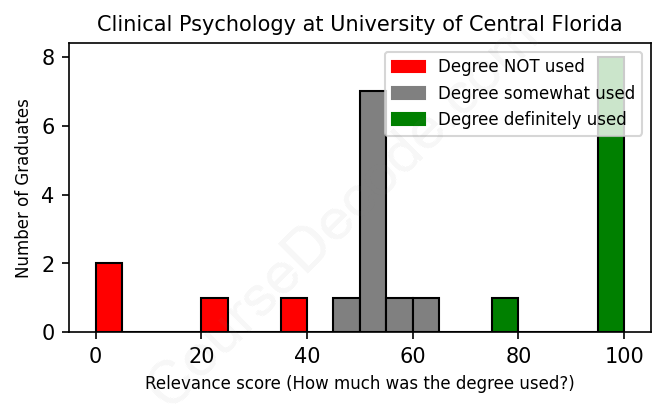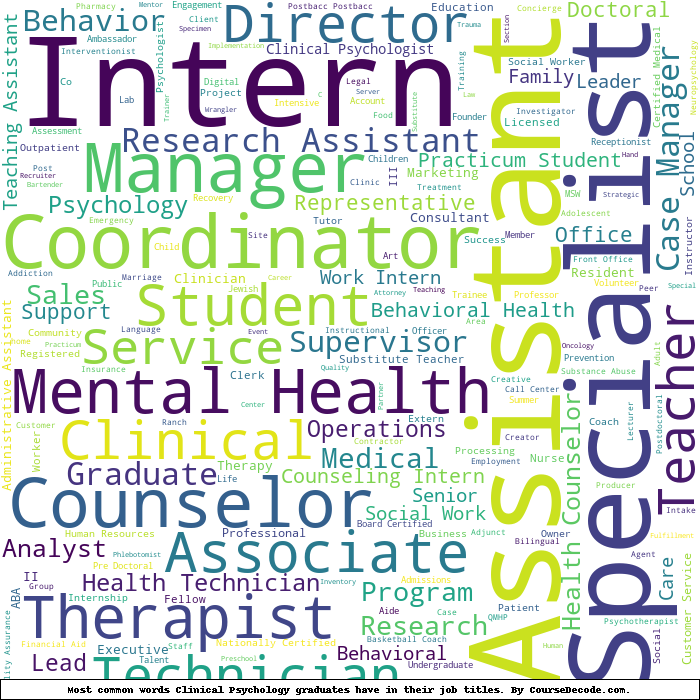
First, some facts. Of the Clinical Psychology graduates from University of Central Florida we've analyzed , here's how many have used (or NOT used) their degree in their career:

These are estimates based on AI analysis of 23 LinkedIn profiles (see below).
The verdict? Slightly below average. Overall, with an average relevance score of 63%, Clinical Psychology graduates from University of Central Florida have a slightly lower likelihood (-4%) of finding work in this field compared to the average graduate across all fields:
And for comparison, here's the chart for all profiles we've looked at across all degrees.
Also, after graduating, only 26% of these graduates have pursued further education other than another Bachelor's degree (such as a Masters degree or other), compared to the average across all profiles of 35%. This suggests a Bachelors degree is enough for most Clinical Psychology graduates, and it's normal to look for work straight after graduation.
See the details:
|
Relevance score: 48% We think this person has gone into a career only somewhat relevant to their degree. We think this person has gone into a career only somewhat relevant to their degree.
DEGREE INFOGraduated in 2022 from University of Central Florida with a Bachelor of Science - BS in Clinical Psychology. Also pursued further education since (see below). JOB HISTORY SINCE GRADUATIONSubstitute Teacher Palm Beach County School District Aug 2022 - May 2023 Legal Intern  EILEEN D. JACOBS, ATTY AT LAW Sep 2023 - Dec 2023 Law Student  Stetson University College of Law Aug 2023 - Present Volunteer  Community Legal Services Dec 2023 - Present FURTHER DEGREES DONE SINCE GRADUATINGDoctor of Law - JDStetson University College of Law 2023 - 2026 ABOUTNo information provided. |
The top 10 most common jobs done by the graduates we've analyzed (ranked most common to least) are:
From looking at the LinkedIn profiles of people who graduated with a degree in Clinical Psychology from the University of Central Florida, it’s clear that many have found themselves in roles that are quite relevant to their field. A big chunk of them have taken on roles like Mental Health Counselor, Behavioral Health Technician, and Counseling Intern. These jobs typically leverage the psychological principles and therapeutic techniques that they learned in school, making them directly connected to their academic background. It's great to see that many have managed to land positions that put their knowledge to practical use, especially in settings like healthcare and therapy.
However, there’s also a noticeable number of graduates who have ventured into jobs that aren't directly related to Clinical Psychology. For instance, roles in sales, teaching assistants, and even working as insurance agents or travel agents don’t specifically require the core skills acquired from their degree. While they may use some interpersonal skills and knowledge of human behavior in these positions, they don’t encompass the full scope of clinical practices. Overall, it seems like the common trajectory leans towards relevant, psychology-focused roles, but there’s definitely a mix of jobs out there that veer away from direct application in clinical settings.
Here is a visual representation of the most common words in job titles for Clinical Psychology graduates (this is across all Clinical Psychology graduates we've analyzed, not just those who went to University of Central Florida):

So, if we look at what graduates from the University of Central Florida's Clinical Psychology program are up to, it’s a bit of a mixed bag. Right after graduation, many students seem to dive into counseling roles or related internships, like being a Behavioral Technician or getting involved as a Mental Health Counselor. That makes sense because those jobs line up nicely with what they studied. However, we also see some graduates taking a detour into unrelated fields like teaching assistants or even sales roles, which might suggest they’re still figuring things out or maybe looking for stability after school.
Fast forward a few years, and you start to see a clearer picture of career paths. Those who stuck with mental health roles, like Behavioral Technicians or counselors, often see some growth, usually stepping up into more responsible positions or continuing their education in the field. Others, like those who went into law school or started in totally different sectors, seem to be blending their clinical knowledge with other career interests. While there are definitely success stories that are relevant to Clinical Psychology, it's evident that not everyone is directly linking their degree to their jobs, which is super common these days. In the end, it looks like graduates are carving out their paths, with some staying closely tied to Clinical Psychology while others explore broader horizons – which is totally okay!
Getting a Bachelor’s degree in Clinical Psychology at the University of Central Florida, or really any school, can be a mix of challenging and manageable. It’s not the easiest degree out there, mainly because you’ll dive into some pretty intense subjects like research methods, psychological theories, and statistics. You’ll need to stay on top of your readings and assignments, and some of the classes can be a bit tough, especially if math isn’t your strong suit. That said, if you’re genuinely interested in how the human mind works and are willing to put in the effort, it’s definitely doable! Just remember, like any degree, it all depends on how you approach it and how well you manage your time.
Most commonly, in the LinkedIn profiles we've looked at, it takes people 2 years to finish a Bachelor degree in Clinical Psychology.
So, looking at these Clinical Psychology grads from UCF, it seems like they might not be rolling in the dough just yet. A lot of them are starting out in internships, assistant roles, or part-time gig situations, which usually don't pay that well. For instance, being a mental health technician or a behavioral health technician typically earns less compared to more established jobs in the field. Even the ones who've landed decent positions like HR recruiting assistant or insurance agent might not be pulling in hefty salaries just yet—especially when compared to roles like licensed psychologists or higher-level counseling positions that require more experience or education. It's clear they’re gaining valuable experience, but they're still in that entry-level phase where the pay isn't the greatest.
Here is a visual representation of the most common words seen in the "about" section of LinkedIn profiles who have a Bachelor degree in Clinical Psychology (this is across all Clinical Psychology graduates we've analyzed, not just those who went to University of Central Florida). This may or may not be useful:

Here are all colleges offering a Bachelor degree in Clinical Psychology (ordered by the average relevance score of their Clinical Psychology graduates, best to worst) where we have analyzed at least 10 of their graduates:
| College | Score | Count |
|---|---|---|
 University of Central Florida University of Central Florida
|
63 | 23 |